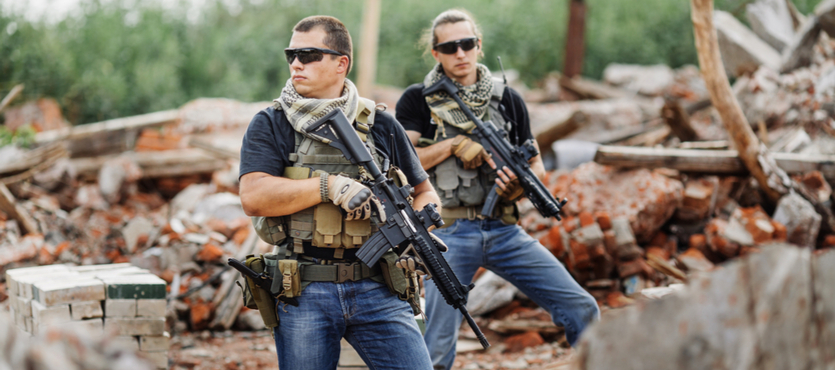Three Russian journalists were recently murdered in the Central African Republic, apparently because they asked too many questions about Russian mercenaries in that county. If the Russians are there, will contractors show up soon, as they did in Syria?
Vladimir Putin opponent Mikhail Khodorkovsky bankrolled Alexander Rastorguyev, Kirill Radchenko and Orkhan Dzhemal as they inquired about Russian military activity in the country. Local officials claimed that Muslim militants may have killed the trio in a robbery gone bad, but the circumstances seem to indicate a more sinister motive. The Russian Constitution prohibits mercenaries from engaging in political operations, but that appears to be the case in Syria and perhaps in the CAR.
A spokesperson for the Russian Foreign Ministry called such speculation “drivel” and denied all government involvement.
How We Got Here
For the first half of the 20th century, what is today the CAR was known as Ubangi-Shari, which was part of French Equatorial Africa. This sprawling territory included the modern countries of the CAR, Chad, Cameroon, Gabon, and the Congo.
In many places, the French were very good colonial administrators. But just like their lordship over Haiti, French control over Ubangi-Shari left a lot of scars. Things got off to a bad start. Between 1890, the year the French arrived, and 1940, roughly half the indigenous population died due to overexploitation.
The conditions led directly to the Kongo-Wara rebellion (a/k/a the “War of the Hoe Handle”) in the late 1920s. French officials carefully hid the details of this insurrection, which may have been the largest such conflict in Africa during this time period, from the folks back home.
Things began to change about that time, as the Ubangi-Shari allied itself with the Free French during World War II.
The oddly-named Central African Republic obtained its independence in 1960. Except for a brief period between about 1993 and 2004, a series of military strongmen have enforced one-party rule in the CAR.
Largely as a result of colonial mismanagement and despotic regimes, the nation is one of the poorest countries on earth. That is despite the fact that the country has mineral deposits, like uranium, oil, diamonds, and gold. Moreover, because of the vast savannahs in the country, there is a considerable amount of arable land. That’s a rarity in this Saharan region.
Why the CAR Matters Today
The nation is in a precarious position, with al-Shabaab (an al-Qaeda offshoot) to the east and Boko Haram (an ISIS offshoot) to the north. Now, with apparent ongoing Russian infiltration on top of seemingly endless civil war, the CAR could become the next Syria.
There is definitely a link between poverty and the rise of ISIS in Syria. If conflict escalates, it could spill over into other areas of Africa. That could include Kenya and other relatively stable countries.
In the midst of all this, American military forces recently pulled out of the CAR. Between 2011 and 2017, U.S. special forces were in-country. During that time, they helped curtail the activities of the LAR (Lord’s Resistance Army), which supposedly killed some 100,000 people over about a thirty-year period. But perhaps due to frustration over the American’s inability to capture LAR leader (and wanted international war criminal) Joseph Kony, the DoD pulled the plug.
Potential Contractor Roles in CAR
If American servicemembers return, contractors will almost certainly come with them, just as they are in Niger and other nearby parts of the continent. In places like these, contractors fill a number of roles, including:
- Training: R. Lee Ermey-type motivation may go over very well in the United States, but foreigners sometimes need a different approach which only contractors can provide.
- Intelligence-Gathering: Contractors often have certain skill sets which regular servicemembers lack. Intelligence-gathering is especially important in (relatively) huge African countries like the CAR, as the 2017 episode in Niger proved.
- Combat Support: Contractors often perform important duties like checking identifications at roadblocks. Activities like this free up regular servicemembers for offensive operations. By law, American private military contractors cannot participate in these activities.
- Logistical Support: For every soldier in the field, the army usually needs at least one person like a cook, mechanic, doctor, office administrator, or morale officer. Contractors come from diverse backgrounds, so they are well-suited for these roles.
Contractors are much cheaper for the DoD. Although they make more money than servicemembers, the government provides no benefits and can terminate payments as soon as the contractors muster out.
Injury Compensation Available
If the U.S. military returns to the CAR in any capacity, injured contractors may be eligible for benefits under the Defense Base Act.
Additionally, the illness or injury must have a nexus with the deployment. That could be a direct relationship, like a militant ambush or a Russian offensive. Or, it could be indirect, such as a suicide bomber blast in a marketplace. The injury need not occur during duty hours and/or at the military installation itself.
Typically, available compensation includes money for lost wages and medical bills. Most victims receive two-thirds of their average weekly wage until they are fully cleared to go back to work. In terms of medical bills, the DBA pays for all reasonable expenses. That includes everything from the first medical treatment at the scene to the last day of physical rehabilitation.
For more information about available DBA benefits, contact Barnett, Lerner, Karsen & Frankel P.A.

